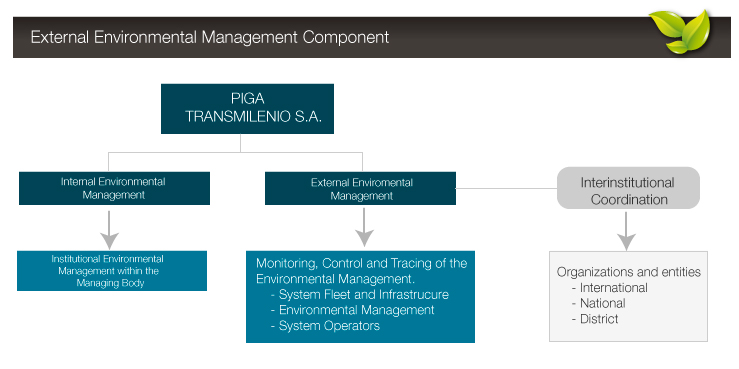PLANNING INSTRUMENTS
TransMilenio SA participates in the District Environmental Management Plan - PGA, which is planning instrument to define and guide the environmental management of all district strategic players through the following planning instruments:
- Four-Year Environmental Action Plan - PACA
- Institutional Environmental Management Plans - PIGA
These instruments are developed guided by six principles:
- Environmental quality for sustainable development
- Sustainable development as social and cultural project
- The primacy of public and collective
- Eco-efficiency function and urban form
- Positive Transformation territory
- regional urban environmental management, national and global articulation Leadership.
The main aims PGA incline in the Capital District for the rational use of resources and a healthy environment, safe, supportive, diverse, inclusive and participatory in its territory for present and future generations, acting responsibly with the region and the planet .
In this context, nineteen were raised environmental goals for the city, which in turn are grouped into three broad categories:
- Environmental Quality;
- Eco-efficiency;
- Environmental and Social Harmony.
Four-Year Environmental Action Plan - PACA
Since the adoption of existing Development Plan, PACA is structured as environmental planning instrument that integrates short-term investment actions and environmental management major implementing agencies of the Capital District Environmental System, which should contain the actions prioritized with his environmental budget allocation for the fulfillment of the goals set for the four, this instrument harmonizes environmental actions and investments District Development Plan with the PGA. The TRANSMILENIO PACA SA was formulated in accordance with the guiding principles and under the guidelines of the Environmental Authority District, mainly targeting the following objectives of PGA:
- Environmental quality of public space
- Air Quality
- Quality landscape
- Stability climate
- Efficient use of energy
Institutional Environmental Management Plan - PIGA
TransMilenio SA Institutional features the Environmental Management Plan (PIGA) planning tool of all environmental activities by the Department of Environmental Management Planning Advisory Office.
This plan has three main elements:
- Internal Environmental Management: Involves environmental management processes that take place in the areas administered by Transmilenio SA (administrative headquarters, portals and stations). It is aimed at achieving the objectives of eco-efficiency and environmentally responsible within the organization, in each of their headquarters and in each of his actions, developing projects that contribute to improving the environmental management of the entity to minimize the environmental impact by the official sector of the Capital District.
- The external environmental management: relates to environmental management and control system is done to comply with environmental provisions and the current regulations that are involved in the management processes that perform system operating companies.
- Interagency coordination: Behold the processes, communication and coordination mechanisms and the relationships established with other entities that are part of the District Environmental Council and with universities, agencies and national and international order that relate to the system

Integrated Management System
The Integrated Management System in its environmental component involves the PIGA as one of the environmental management tools for operational control of environmental aspects identified as significant. In turn, with the main activities of this Plan is updated characterization of the Environmental Management establishing the inputs, outputs and interaction with other processes to help achieve the strategic objectives of GIS and continuous improvement of environmental performance system. (For more information go to "Integrated Policy Management System")
Fecha de publicación 27/06/2014
Última modificación 27/06/2014


